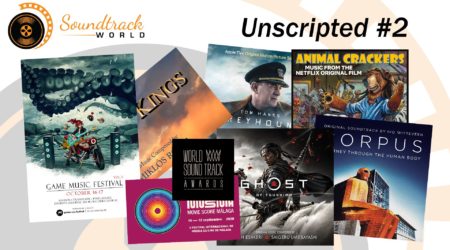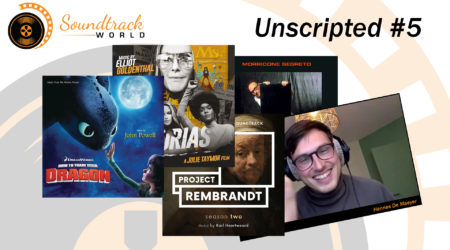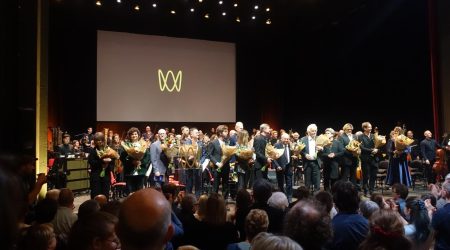During the World Soundtrack Awards I had the opportunity to talk to some of their guests. One of these conversations was with composers Stephen Barton and Gordy Haab. They have been working in the soundtrack industry for quite some time, but recently, their work has become known to a broader audience, including their collaboration on the Star Wars Jedi computer games. During this interview we talked a lot about their work on these games, but we also touched on some aspects of their working habits and whiskey. Seeing how they responded to each other was quite exciting, making it more of a conversation than an interview. This event took place on October 21, 2023.
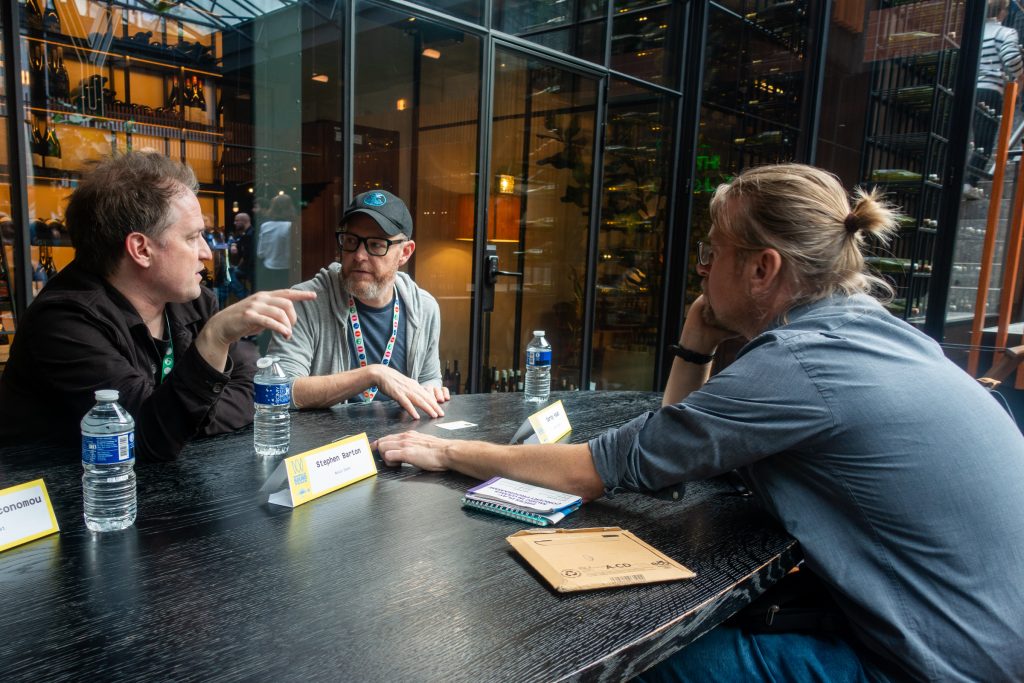
Anton Smit: Thank you for this interview! I wanted to specifically talk to both of you because you are now working so closely together. One thing that triggered me was an interview you both did for the Game Maker’s Notebook, and you, Stephen, said during that podcast that for the music for Star Wars Jedi, each track is credited to both of you.
Stephen Barton: Yes, I did.
Anton: So my question to the both of you is, what does collaboration mean?
Gordy Haab: That is a really good question! For the both of us, it means being completely open-minded to each other’s ideas. We work and write together, but often, we write ideas individually, and then we share those ideas with each other and give input. For example, if Stephen writes a theme and asks me what I think about it, I could suggest changes, like reharmonization in a different way, and then I can pass it back. He can agree with some of the changes but can also offer a different solution. So we kind of go back and forth in that way, and it feels like it has both of our aesthetics infused.
Stephen: We definitely do divide stuff up. Although there are cues sometimes where we are sort of transitioning one thing, or where I will take something you have started and finish with like the ending or something. It is really interesting because there is this idea that you can write a melody or write a theme that pops into your head fully formed, like maybe when you are in the shower at 2:00 in the morning. Maybe once or twice, it does, but not always, and actually, generally speaking, one of the things that is interesting as composers is always iterating. When you try something out, there is usually a nagging voice in your head that sort of says that it could have been better, but you sort of leave it as is. What has been really interesting is we have both been able to use each other as part of that process. Here is the theme that I have: what would you do with it? He will do something completely different. Like almost all of my favorite versions of any of the tunes I had a big hand in are his versions.
Gordy: Likewise. For me, it is the exact same thing. It gives us this luxury of not having to be such a critic of our own music because I can get something to what I feel is 80%, but I am just missing that one last thing, whatever that may be, and having the ability to pass that off to Stephen. Especially when I sort of hit a brick wall to see what he thinks.
Stephen: Sometimes it is almost an element of like: Oh no, you got the right thing. Don’t throw that out, because it is really good. There are definitely times where you will play it and say that you are not sure about it, but you get that extra pushover to hear that it is working and that is really good, and here is why it is good.
Gordy: That gives each other the sort of confidence to go with it because we are our own worst critics, as artists. It’s nice to hear somebody else kind of weigh in and say that you are not crazy, and it actually really works!
Anton: Can I ask for just a specific example? The flight sequence with Merrin and Cal in Star Wars Jedi: Survivor, could you tell me how that came to be?
Stephen: That sequence is largely one of Gordy’s. We sort of bounced back and forth on Merrin’s theme. It was really funny because that was a really good example of a theme that just existed. Nick, the music director, and I were at the studio, and Gordy was at home and he sent it over to us. We thought it was an awesome theme, but it was Merrin’s theme. It wasn’t necessarily written specifically for her. At that time, Merrin was a character who wasn’t actually fully fleshed out at that point. That theme was her character, a thousand percent where we want to go with it.
Gordy: Exactly. The collaboration itself happened in the first game, in Fallen Order. Merrin’s theme, like I was saying, was just a small general motif that I had initially sort of come up with for the planet Dathomir. When it became Merrin’s theme, we adapted it together a bit, and then it kind of just lived as this small motif for the character. In Survivor, we had this opportunity to sort of really blow that theme up and create this heroic version of it. I sort of took on that task.
Stephen: And then you threw the kitchen sink at it!
Gordy: Yeah, exactly!
Anton: It is so great to see both of you because I really see some chemistry between you two.
Gordy: Yeah, definitely!
Stephen: It is true. Right from the outset. It was one of those things. I don’t even know who floated it, Electronic Arts or Respawn. We have met before, but when we officially met for the first time, we chatted for like two hours and then realized we actually hadn’t talked about music at all! We talked about coffee, whiskey, travel, more whiskey. By the way, Gordy has a very good whiskey collection, and we tend to try to do meetings in his studio if we can.
Gordy: It fuels a lot of creative ideas.
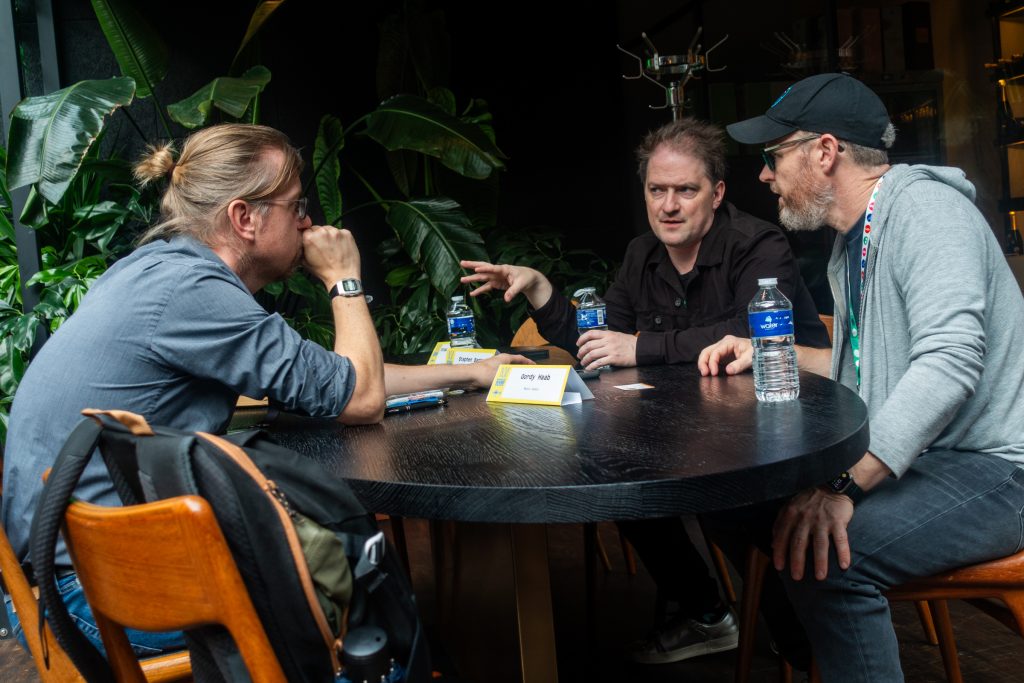
Anton: Besides working together, you also work separately on projects. It is pretty funny because you, Gordy, are well known as “The Star Wars guy,” with more than 80 hours of Star Wars music under your belt, and you, Stephen, have been diving into the Star Trek world with the third season of Star Trek: Picard. So, how do you write a specific type of music without writing that type of music and not copying the original material?
Gordy: Yeah, that is always sort of the big question. It is something I have dealt with for a good portion of my career, having written a lot of music for Star Wars projects. I always have one of two options. I could do like a pastiche of the original scores from the films. I kind of think of it like a “paint by numbers.”
Stephen: It wouldn’t be easy, by the way. You have done a cue in the vein of extending something that was a John Williams thing. I think in Star Wars: Battlefront? They were like, “It is just an extension of the John Williams cue,” and I thought it was really difficult! What planet are you from? That is insanely hard!
Gordy: It is a difficult task to do that. I think that is the more difficult task: To step into John Williams’ shoes and do that pastiche, “paint by numbers” approach. The other option is to, rather than to do that, is to find a way to make it my own personal aesthetic but use the same color palette as was used in the original scores. It is either “paint by numbers,” which would just be sort of a watered-down version of the original, or I will take the same colors that he used and paint my own painting using those colors. I think that was sort of the better approach because then it still fits into the universe, but it feels like my personal aesthetic. It is always my own music.
Stephen: We have talked a lot about things like ethos as well. One of the things we realized very early on is that actually one of the interesting places to look is to listen to the things you want to listen to, not to listen to Williams at all. Certainly, one of the beautiful things is that we also don’t really temp track the game. They don’t for a myriad of technical reasons. The biggest of which being the games are so complicated now. It is quite easy for one of the audio people to put a piece of temp music in, and if they don’t label it, it can accidentally ship with the game. It is like one of those things where basically a lot of game companies are not temping with stuff. One of the things we look at is everything else and, in particular, influences on the original scores and where did they come from. Everything from looking back to like Korngold, to looking at more classical things like Sir Edward Elgar and Stravinsky but then even looking back one step further from that. It is almost like going with the same origins but then going off in a new direction with it.
Gordy: It is like rather than go to the source, we went to the source of the source.
Stephen: At the end of the day, what is great about these franchises now is that you want to use these themes, but you are playing a Star Wars game. You don’t need the music to be telling you the whole time that you’re playing a Star Wars game. Also, by using the themes incredibly sparingly, especially John Williams’ themes, you can make them really land. We use the force theme twice in the entirety of Jedi Survivor. They are incredible tunes, but the power of them is so diminished if you overuse them.
Gordy: Exactly, they are much more impactful if you use them very tastefully and just in that one moment that calls for it.
Anton: Stephen, do you have something to add to that from the Star Trek perspective?
Stephen: Yeah, totally. Star Trek was interesting, because when we came to do the third season of Picard, one of the things we wanted to do was to look back at the whole legacy. This is the end of The Next Generation, but that story also represented so much for people who are Voyager or Deep Space Nine fans. But again, it is that thing of like you don’t want to merely just push the button and needle drop a theme. That does not really work because people who are fans of this music are incredibly sensitive to anything done in a non-legitimate way. If it is just sort of slapped in. These are the people who immediately know if it is not legit, If it is not done with the greatest reverence. I don’t know what it is about exactly. It’s sort of something slightly inevitable, I guess, but you just know when it is being done for just the wrong reasons.
When we were working on Picard, it was something that I would like to talk to Gordy about because it was like one of those things where I was saying like: What do you think about this idea or that? Because of so many of those things, you just want to be sure you are doing it justice. Even down to looking through all of the Goldsmith scores, and this is where Gordy’s knowledge of the Williams’ way of the pen and paper scores is much deeper than mine. I am very grateful to be able to just sort of go through with Gordy’s work and really be able to pick apart cues he is working on. Sort of going: Okay, you understand the construction of them so deeply. That has been a great learning experience for me.
Anton: Have you already started writing pieces by hand, like Gordy has been doing?
Stephen: I tend to work by habit in DAW, but I have always worked in a DAW in a very score-like way. If you open up one of my sequences, it is broken out into violin 1A, violin 1B, violin 2, violas and every single thing. Everything is orchestrated out. So really orchestration for me is like largely a process of really transferral onto the page. But yeah, there are definitely things where I will go and work stuff out much more. I think the interesting thing with Gordy’s process, which I have learned a lot from, is that there are times where, if you are in scoring, then it comes to the demo and have a bit of a back and forth, there are things you would not ever put on the page, and you go: Oh hang on, that really works.
Gordy: Yeah, exactly. It really comes down to just the process that is most comfortable and getting the ideas out as quickly as possible. Stephen, for example, is a fantastic piano player. I am an absolutely terrible piano player. To play straight into the DAW is actually cumbersome to me, and I tend to lose ideas if I try to work that way. I actually do my best work without a piano or anything, just a piece of paper and a pencil, and then just a very quiet space with no distractions. I can just hear what I am hearing in my head and just write it down. It is just a very simple sketch form. I am not writing the full score, for example, but that is the quickest way for me to get an idea from the brain to the page. It is just through a pencil for me. It is not necessarily for everyone. I don’t think there is a right and wrong way. it’s just the way that works best for my approach.
Stephen: The funny thing is, with the nature of what we do, is that we have to effectively sell our music at the end of the day to someone and say: We want you to approve this and allow us to go record it. So, you always end up with a demo at some point, but the orchestrational side of it is really interesting for me. Sequencing is really difficult because it is often a piano-based thing. There is a danger that you can orchestrate pianistically. We were joking with Tommy Pearson, who we know is a very good timpani player, and he is presenting the awards tonight; we were joking about timpani parts played by keyboard players, where it bears no resemblance to actual timpani playing.
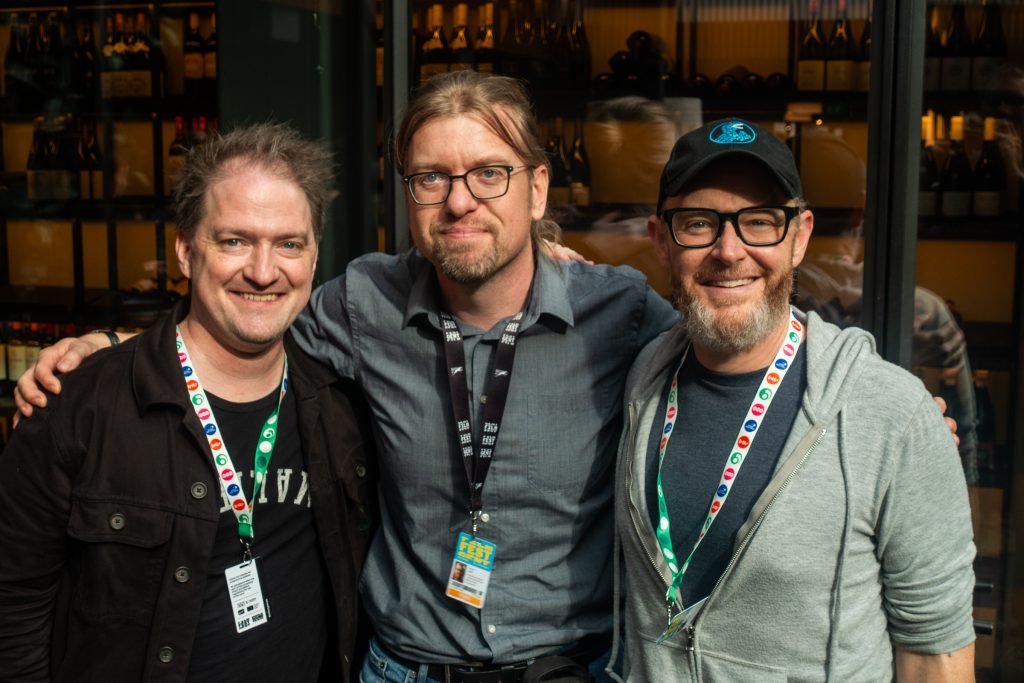
Anton: I wanted to ask a final question because you also work separately. We have the Picard music, which is brilliant. I have absolutely no words for Gordy’s score for Creation of The Gods I – Feng Shen Trilogy. I hope more people will listen to that because that score is astonishing. So, just a quick question. It is probably not a big secret that there will be a third Jedi game coming out.
Stephen: Officially, we can neither confirm nor deny!
Anton: That’s fine for me. Are there plans for the both of you, in addition to your Jedi work?
Stephen: I am working on a game with one of the other big Disney-related franchises. That is as far as I could go, but most people could probably figure out what that would be. I have a couple of other game projects I’m working on in the next year and one film.
Gordy: Interestingly, a similar answer. I am working on another game.
Stephen: He is on a really good one, and it is such a shame you can’t see what it is, but it is really good!
Gordy: I feel like when it is announced, it will be one of those moments where everyone is like: Yeah, that makes sense.
Stephen: I can’t believe they haven’t done it, because this is worse than torture, but it is really good!
Anton: But for me, this is always the best cliffhanger in an interview. So how about we talk about it the next time we meet?
Stephen: You will be talking about that one! Wink, wink!

